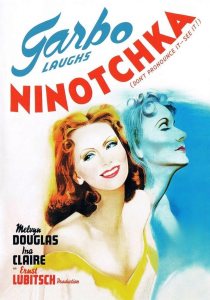
Ninotchka is the 1930’s comedy where ‘Garbo laughs!’ as a stern communist official whose romanced by suave Melvyn Douglas in Paris. Directed by Ernst Lubitsch.
Synopsis
Three Russian trade officials (Sig Ruman, Felix Bressart, Alexander Granach) are dispatched from Moscow to Paris, tasked with selling jewels confiscated during the Revolution, including those of the exiled Grand Duchess Swana (Ina Claire).
The boys are dazzled and corrupted by the Parisian lights and champagne lifestyle, meaning their dour comrade Nina Ivanovna ‘Ninotchka’ Yakushova (Greta Garbo) comes to sort them out.
Catching wind of this, Swana sends her on-off lover Count Léon d’Algout (Melvyn Douglas) to intercept Ninotchka and romance her so she can reclaim the jewels. Ninotchka soon finds herself also being swayed by the French capital.
Review, by @Reelreviewer
Don’t make an issue of my womanhood.
Comrade Ninotchka (Greta Garbo) puts her feminist, communist foot down.
Greta Garbo was the stern Swede who headlined a number of MGM melodramas from 1926-1941. She was usually a swooningly doomed romantic heroine.
With her traffic-stopping, unsmiling patrician beauty, a roll-call of handsome Metro actors, off camera talent that was second to none, and mostly dodgy scripts based on classic novels or mouldy plays, audiences cared little how poor quality these productions tended to be.
Of course she had laughed on screen (and presumably, off screen) before; the scripts yielded their fair share of unintentionally funny lines (“What’s the matter, Mata?” says Ramon Novarro in Mata Hari, 1931), but she never had a movie with deliberate and good…until Ninotchka.
The tagline may not be 100% accurate, but, if nothing else, it shows how canny MGM’s 1939 publicity team were to grasp onto the novelty value of Garbo ‘slumming’ it in a ‘chuckle epic’ and letting rip with a full throttle, throaty laugh.
Notoriously shy and reluctant with new crew members, the urbane German director famed for ‘the Lubitsch touch’ (a light, almost flippant comic treatment of human relationships and sexual situations) handled the difficult actress with the same consummate verve as his other productions, eliciting a charming and genuinely funny, deadpan turn as the frosty Russian who thaws in capitalist Paris.
MGM’s trick of saving their most precious and valuable commodity to the last acceptable moment means 19 minutes of screen time passes before Garbo is on screen.
Douglas stars in his second film with ‘the divine one’ (after As You Desire Me, 1932), chews the scenery and almost steals the show from Garbo. He gives the smart dialogue (co-written by Billy Wilder, soon to start on the road to being one of Hollywood’s most famous and accomplished directors) a witty polish and his co-star some extra glean.
Co-star Ina Claire – a Broadway actress who made the occasional movie – is likewise a joy as the glamourous and haughty Grand Duchess Swana. Her jewellery is merely a sparkling red herring. Far more visible is her extraordinary coiffure, something she tends to assiduously when we first see her.
To modern ears some sentiments and humour in the otherwise delightful script may strike the wrong note. The opening title card calls brunette women “sirens” and compares them to air raid warnings. There’s also an uncomfortable scene with short-skirted usherettes being pawed (off camera) by a room full of loping lotharios.
Léon comes across at times as a bit of a sex pest at times, telling Ninotchka at one point: “Have you ever seen a French court when a beautiful woman sits and raises her skirt a little?” But, in the main, the script is charming and vivacious. To close the review, here are some of Ninotchka’s great lines:
- “But darling, we won’t have to worry about your future if you raffle off your past!” (Léon to Swana about selling her jewels).
- “If we had known you were a woman, we’d have greeted you with flowers!” To which Ninotchka responds: “Don’t make an issue of my womanhood”.
- Asked by her comrades how things are in the mother country, Ninotchka says: “Very Good. The last mass trials were a great success. There are going to be fewer but better Russians.”
- As a porter makes to carry her bags, Ninotchka remarks it’s an example of “social injustice”. He responds: “That depends on the tip!”
- Aping Garbo’s famous line in Grand Hotel (1932), she is asked: “Do you want to be alone, comrade?”
- Ninotchka asks Léon why he has to flirt. After he explains it is instinctual, she drolly replies: “Suppress it.”
Click here for more film reviews about our mentioning Greta Garbo.
Cast & credits
Director: Ernst Lubitsch. 1h 50m (110 mins). MGM. (U).
Producers: Sidney Franklin, Ernst Lubitsch.
Writers: Charles Brackett, Walter Reisch, Billy Wilder.
Camera: William Daniels.
Music: Werner R. Heymann.
Sets: Cedric Gibbons.
Greta Garbo, Melvyn Douglas, Ina Claire, Bela Lugosi, Sig Ruman, Felix Bressart, Alexander Granach, Gregory Gaye.


